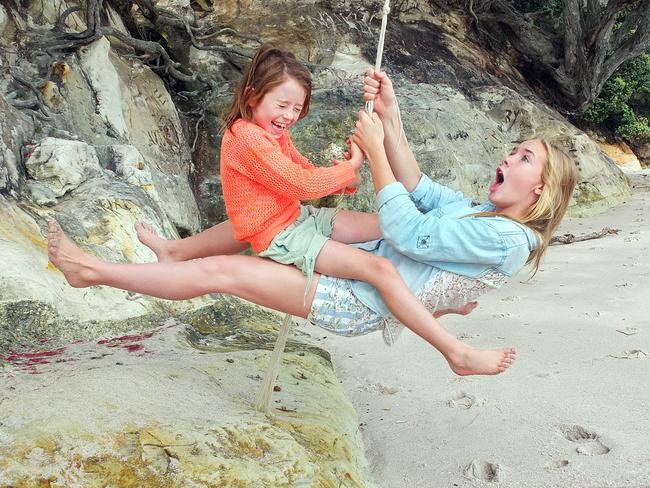Angela Mollard: We have the template to mend childhood – we’ve done it before
Are Gen Z the last generation to have a real childhood? Angela Mollard’s kids think so, but she writes we already have the template to fix their woes, having changed the status quo when all thought it was impossible before.
Opinion
Don't miss out on the headlines from Opinion. Followed categories will be added to My News.
My youngest daughter has just turned 21 and, to mark this milestone, her friend sought letters from 21 important people in her life.
“Your letter,” she tells her big sister, “was the best of all of them.”
It was a lovely letter. Far better than mine, but I was busy making 4000 sausage rolls and mixing tequila and pineapple juice for some noxious drink she’d requested for her party.
My elder daughter, meanwhile, had clearly given much thought to compiling 21 memories for her sister.
She recalled the day of her birth when “dad gaslit me that we had an 11-toed mutant” and her disproportionate distress at the death of her sixth favourite goldfish.
She also reminded her of the time I left the two of them standing alone in the red-light district in Barcelona as I searched for a bathroom.
It was a letter full of humour and love, and as they chatted about it over dinner this week, my 21-year-old said something unexpected.

“You know,” she mused, “we were the last generation to have a proper childhood.”
Her sister agreed. And in that moment my heart cracked a little for all the kids that have come after my two burst into the world at the beginning of a new millennium that seemed so full of promise.
This new century held so much hope but less than quarter of the way through, childhood is broken, snapped like kindling on the raging bonfire of social media and the bullying, porn, self-harm, sextortion and horrific mental health problems it has sparked.
Today’s children are guinea pigs, not in a quirky social experiment but a full-scale global calamity.
When 12-year-olds take their own lives because of a bullying pile-on by their peers, and “barely legal” school leavers are solicited for sex on video by a couple of morally messed up content creators, you know society’s fabric isn’t just a bit careworn, it’s in tatters.
Listening to my 21-year-old lament the lost childhoods of the kids she babysits – “it’s all screens mum, and even their toys are so elaborate they don’t have to use their imaginations” – you know things are bad.
Surely the early 20s are the age of optimism, the moment when everything is stretched out golden and beckoning.
Yet here they are reminiscing like octogenarians about “back in my day”. Worse – and this really made me sit up and listen – they worried aloud about how bad things might be when they have their own children.
As they enthused about their device-free first decade of life, of dancing nude in the rain and lighting fires – Bear Grylls-style – in the back garden, and the youngest being lowered headfirst into the recycling bin by the neighbourhood kids seeking plastic bottles for their experiments, I wondered how we can mend childhood.
How can we restore innocence and imaginations along with kindness and collegiality?
How can we build kids buoyed by nature and friendship and fun, not an insidious algorithm that leaves them so damaged they then cause damage?

Well, we have a template. We’ve done it before. We’ve changed the status quo when all thought it was impossible and restored safety for future generations.
Nearly 20 years ago we had a big, gutsy, gun amnesty that was envied around the world. We valued collective safety over personal freedom and drove through policy that was as innovative as it was effective. It’s that boldness we need to call upon now.
The research is in, as argued by Assistant Minister Andrew Leigh, in an essay for Jonathan Haidt’s agenda-setting Substack on all issues related to social media.
Analysing Australian data, Leigh points out that between 2007-10 (when smartphones and social media emerged) until 2019-22, suicide deaths rose 23 per cent for males and 70 per cent for females, while hospitalisations for self-harm rose 15 per cent for males and 43 per cent for females.
Those reporting mental health disorder rose 40 per cent for males and 60 per cent for females.

Those statistics are why Australia is leading the world in setting a minimum age of 16 for creating a social media account. The onus is on social media platforms, not parents, with huge fines for breaches.
Naysayers point out all the reasons it won’t work but, as Leigh writes, just because the law will be tested is not a reason not to legislate.
In any case, once you establish a new societal standard, parents will quickly comply. With the law as ballast, they will once again become tribes working in the best interest of their children.
Perhaps then kids can once again have a “proper” childhood floating paper boats down rain-soaked gutters, playing “ding-dong-ditch” and, as ours loved, having a picnic in the local graveyard at night.
As my mum has always maintained: “Childhood is not preparation for life, it is life.”
Imagine if we could become world leaders for having the healthiest and happiest kids.




